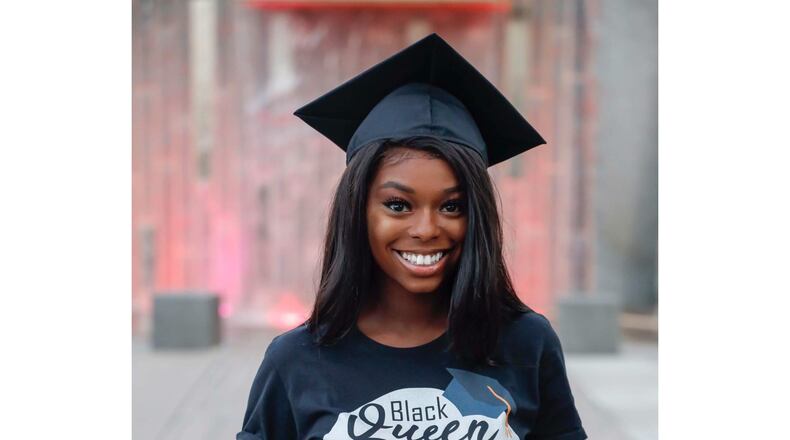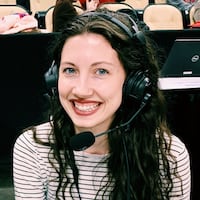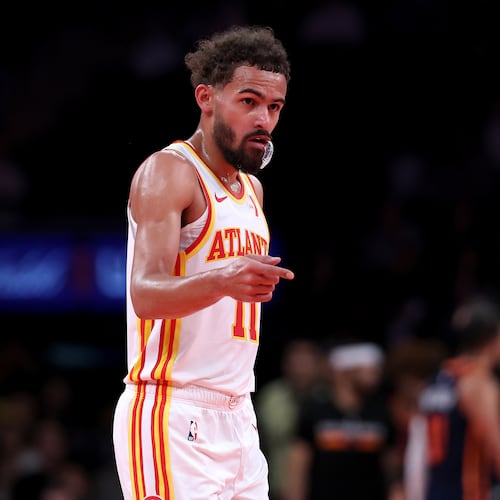Shari-Zhane Harvin-Langley sent one email and one LinkedIn message May 27.
Within a few hours, her words had called the Hawks to action and planted a seed in coach Lloyd Pierce, who has taken on a leadership role with the National Basketball Coaches Association's committee, formed in the wake of George Floyd's death, to discuss solutions to racial injustice.
“I honestly didn’t even think they were going to read my email because I’m probably the lowest of the totem pole of the new people. I’m brand new. … But I was just looking at stuff on Instagram and Twitter and CNN, and I was just mad,” Harvin-Langley said. “I was tired of hearing the same story and seeing the same outcomes.”
After the death of Floyd, an unarmed black man who in a widely circulated video can be seen crying out for air as ex-Minneapolis police officer Derek Chauvin presses his knee to Floyd’s neck, pinning him to the ground for nearly nine minutes, with Floyd handcuffed, Harvin-Langley decided to reach out to the Hawks and encourage them to take a stand against police brutality.
Four police officers have been fired, and Chauvin has been charged with third-degree murder and second-degree manslaughter.
“I was just so upset that day,” Harvin-Langley said. “I honestly couldn’t do any work last week, just off of the fact that I couldn’t focus on anything else. Even now, it’s still just numbing to think about. When I was talking to my mom about it, I’m like, ‘We literally saw someone get murdered. Everyone in this world watched a nine-minute video watching someone get murdered. You only see that in horror movies or TV shows, you wouldn’t normally watch someone sit and die.’ That’s not normal. And that’s just so shocking to me, that he just felt so comfortable to think that was OK.”
Harvin-Langley, 25, was born in Florida, grew up in Ohio and graduated magna cum laude from Claflin University, an HBCU in South Carolina, earning her master’s degree in sports-and-entertainment management at South Carolina in December 2019 before starting work for the Hawks’ inside ticket-sales department in January.
After Floyd's death wasn't discussed in her team's morning meetings (the Hawks are conducting meetings via Zoom these days, because of the coronavirus), Harvin-Langley sent an email to the Hawks' chief people -- diversity and inclusion officer Camye Mackey, CC'ing Hawks CEO Steve Koonin, chief revenue officer Andrew Saltzman, chief marketing officer Melissa Proctor, director of suite sales Ben Brown and manager of ticket sales Matt Carrillo -- at 11:39 a.m. Wednesday. She sent Pierce a message on LinkedIn, including the text of the email.
With a subject line of “Justice for George Floyd!! Standing Against Police Brutality,” Harvin-Langley wrote: “Police brutality towards black people in this country is a major issue. Many of our employees who are black share the same sentiments and FEAR of their own lives, as George Floyd could have easily been an employee, fan or PLAYER (yes even player) of the Hawks … (I)n this long-standing battle, the possibilities are endless to what the Hawks can do to be on the right side of history and fight against police brutality!”
Before sending it along, she discussed the potential message with other Hawks employees who are black and received the advice to include some actions and steps the organization could take, whether it’s making a statement, video, donation or another approach.
At 5:33 p.m. Wednesday, Harvin-Langley got a response from Mackey, thanking her for her message and thoughts and inviting her to help plan and participate in a company-wide conversation “to share thoughts, become educated, help educate others and work to drive change.”
Pierce messaged Harvin-Langley back as well and credited her with helping motivate him to speak out.
“She loves our organization,” Pierce said. “She wanted to know what we were going to do. What was our call to action as an organization about racial discrimination, racial profiling and the murder that she witnessed the other day. There were steps (to taking on a leadership role on the committee). My outrage. My anger. My wanting to say something. Her wanting to say something but not knowing who to say it to, having the courage to send it to our executives. …
“When I got the email, it hit me. Like, what am I going to do? What am I going to say? And I give her a ton of credit. Truly courageous for her to send that email and not be thinking about her job or worried about the consequences or anything of that nature. I think she has spoken for a lot of people that have that feeling.”
On Friday, the Hawks will host a company-wide workshop and conversation about race via Zoom, and Harvin-Langley will join a panel of Pierce, Koonin, Mackey and former Atlanta police chief George Turner, who is now the Hawks’ vice president of security, with the conversation led by Al Vivian, who speaks about diversity and inclusion leadership.
The Hawks had been thinking about having the conversation, but Harvin-Langley’s message helped speed up the process.
“When we got that, that was the spark,” Koonin said. “We had been talking, but we hadn’t been putting actionable plans together. So she lit that spark that has, I would say, easily been the accelerate to us being more involved. I was very proud that we had the culture where a first-year ticket seller would write the senior-most people of the company and say what her expectations were for our culture.”
Even though she’s new to the company, Harvin-Langley felt comfortable coming to management and feels it’s important for the Hawks to speak up as an organization.
“How can we say that we’re true to Atlanta if we don’t speak up on issues that affect those that live in Atlanta?” Harvin-Langley said. “We’re big on inclusion, we’re huge on diversity. We’re all for fan experience and yes, we want to make money, but we have to take a stand. … It’s more than just the money, it’s about the humanity behind it. I felt comfortable coming to the Hawks being that they are a very diverse crowd and they do actually care about their employees.”
When it comes to proposing solutions or what she’ll say during the Hawks’ panel, Harvin-Langley is still brainstorming and gathering ideas.
But coming together to start the conversation is an important first step.
“I don’t think there’s one big solution. I feel like there’s different parts to where we can tweak for whatever the issue is,” Harvin-Langley said. “But definitely having a conversation so people can feel comfortable voicing their opinion in a safe environment. After that, asking those in the community and those who work for us, ‘What should we do?’ … Should we donate? Should we do a march? Should we do a sit-in? Should we have a fundraiser?’ Those are the things the conversation should be about, is action.”
About the Author
Keep Reading
The Latest
Featured


